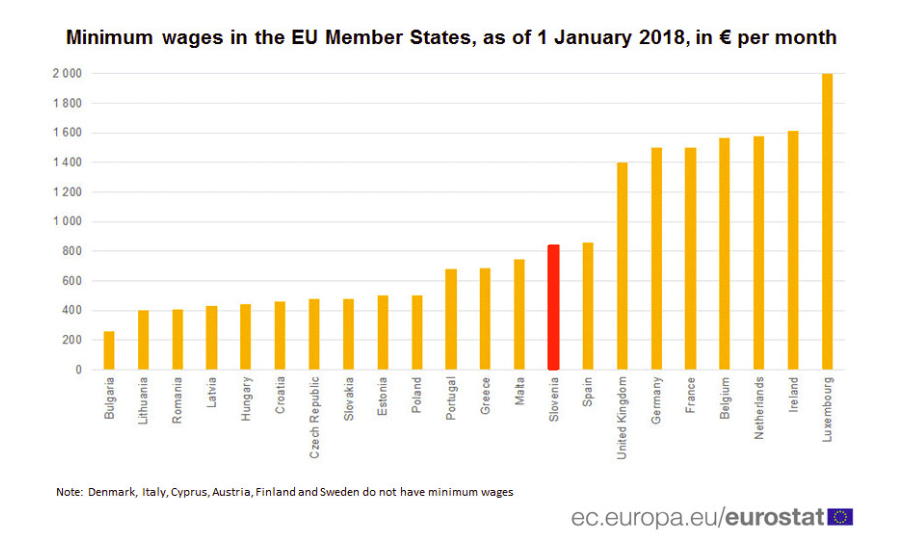Under the proposal, the minimum wage, which currently stands at EUR 638.42 net, will rise to EUR 667 next year and to EUR 700 in 2020.
The minimum wage is currently determined by the minister in charge of labour based on inflation and, optionally, other macroeconomic trends.
Under the new formula to enter into effect as of 2021, the minimum wage will have to exceed the minimum living costs by at least 20%, which would currently net workers EUR 736 a month, the Left's leader Luka Mesec told the press on Wednesday.
According to him, the formula ensures that "all those who work eight hours a day will no longer scrape by at the poverty line, as they have so far".
The Left also wants all the bonuses determined by law and collective bargaining agreements excluded from the minimum wage and paid separately as of 2019, but the exact date is yet to be harmonised.
The Ministry of Labour, Family, Social Affairs and Equal Opportunities proposes 2020 as the year for excluding the bonuses.
"Bonuses will be excluded, it's a fact. The question is just what the most appropriate date is," Mesec said.
While all coalition parties have endorsed the bill, the Modern Centre Party (SMC) yesterday voiced some concerns, including about using the new formula.
But Mesec dismissed these concerns, saying that "apparently they are not in line with their own ministry, which has backed the formula in its expert opinion".
According to him, the ministry said in its opinion that the formula determines a sensible balance between the income of working people and the income of inactive population.
Mesec also refuted the SMC's concern that the bill was not discussed with social partners, noting that it had been agreed with the prime minister the bill would be discussed at the Economic and Social Council, the country's main industrial relations forum.
Addressing concerns about the impact on the budget, Mesec added that it is "virtually neutral, because higher pay in public and private sectors mean more tax receipts."
The Labour Ministry's data show that around 42,000 people, of which nearly 35,000 are in the private sector, currently receive minimum wage.
However, the rise of the minimum wage in January as proposed in the bill will in fact affect around 70,000 workers, Mesec said.
In response to the proposal, the opposition Democratic Party (SDS) said the current system of the minimum wage, base pay and collective bargaining agreements was opaque, proposing a minimum hourly rate instead.
The party filed for an emergency session of the parliamentary Labour Committee, proposing it to call on the government to conduct, together with social partners, an analysis of what the introduction of such an hourly rate would mean and report back to the committee within 30 days.
The SDS also proposes for the committee to call a public debate on the proposal within 30 days, inviting representatives of employers and employees and other persons that could offer useful information.
The party argues that under the current system "workers never know when their labour rights are violated or cannot or would not afford lengthy court proceedings". They believe an hourly rate would be fairer.






